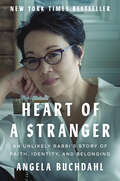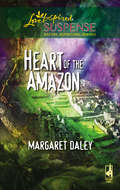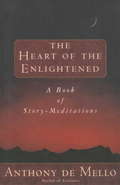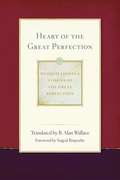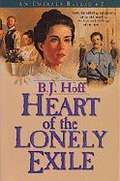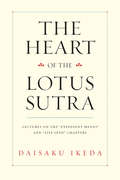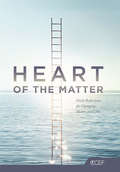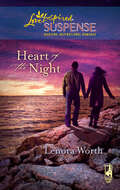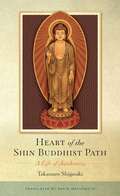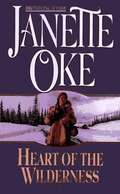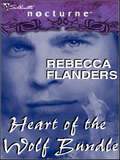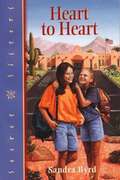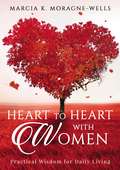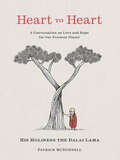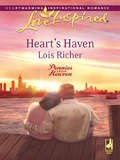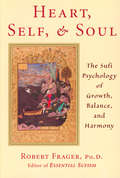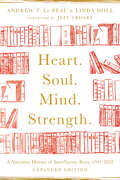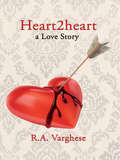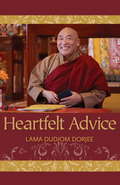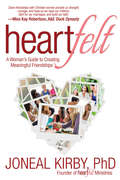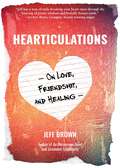- Table View
- List View
Heart of a Stranger: An Unlikely Rabbi's Story of Faith, Identity, and Belonging
by Angela BuchdahlFrom the first Asian American to be ordained as a rabbi, a stirring account of one woman&’s journey from feeling like an outsider to becoming one of the most admired religious leaders in the worldAngela Buchdahl was born in Seoul, the daughter of a Korean Buddhist mother and Jewish American father. Profoundly spiritual from a young age, by sixteen she felt the first stirrings to become a rabbi. Despite the naysayers and periods of self-doubt—Would a mixed-race woman ever be seen as authentically Jewish or chosen to lead a congregation?—she stayed the course, which took her first to Yale, then to rabbinical school, and finally to the pulpit of one of the largest, most influential congregations in the world.Today, Angela Buchdahl inspires Jews and non-Jews alike with her invigorating, joyful approach to worship and her belief in the power of faith, gratitude, and responsibility for one another, regardless of religion. She does not shy away from difficult topics, from racism within the Jewish community and the sexism she confronted when she aspired to the top job to rising antisemitism today. Buchdahl teaches how these challenges, which can make one feel like a stranger, can ultimately be the source of our greatest empathy and strength.Angela Buchdahl has gone from outsider to officiant, from feeling estranged to feeling embraced—and she's emerged with a deep conviction that we are all bound to a larger whole and mission. She has written a book that is both memoir and spiritual guide for everyday living, which is exactly what so many of us crave right now.
Heart of the Amazon
by Margaret DaleyTHE JUNGLE SOUGHT TO CLAIM HER. ASSASSINS MEANT TO SILENCE HER. There was no way her brother was dead. Officials claimed the biochemist had been murdered in the Brazilian rainforest, his body fallen prey to the mists of the jungle. But Kate Collier knew Zach and couldn't leave it at that; Zach was all she had left. Tall, dark and mysterious, A. C. Slader had a past that was as turbulent as the Amazon River. Yet he was the only one who could guide her on a journey from which many never returned. A journey that would stretch the limits of their faith in God and each other. . . .
Heart of the Enlightened
by Anthony De Mello"Said the river to the seeker: 'Does one really have to fret about enlightenment? No matter which way I turn, I'm homeward bound.'" --Anthony de MelloWe are like bears pacing in a cage, Anthony de Mello says. Even if the cage is removed, we keep pacing in the same timid limits. We are afraid to get out. And we think that the only way out is by endless striving and thinking. But this profound healer and spiritual master shows us another way. The Heart of the Enlightened, the sequel to the highly successful Taking Flight, contains more than two hundred of de Mello's favorite stories. Whether Buddhist tales, Hindu fables, Islamic sayings, or Christian parables, the stories de Mello has chosen are sure to seep through to the heart. They touch on relationships, human nature, service, spirituality, and enlightenment. These are stories to be read slowly and savored. They are the key to liberating us from all that would pen us in.
Heart of the Family
by Margaret DaleyA Christmas ConundrumWomen, Dr. Jacob Hartman knew, were a mystery. Take the first time he met social worker Hannah Smith at the Stone Refuge home for foster children. The woman stared him down as if he'd come at her with castor oil. Why? His past was full of heavy-duty heartache, but he was positive they'd never met. And as a former foster child himself, Jacob was deeply touched by how much she cared about the kids at the home, how loving she was--to everyone but him. Which was where, he figured, the mistletoe came in!
Heart of the Family (Love Inspired #425)
by Margaret DaleyHannah Smith has a reason for disliking Dr. Jacob Hartman, the doctor for Stones Refuge Home For Children, but he can't discover what it could be. After all, he's never met her before. He doesn't know Hannah has memories that link her past to his; though she's attracted to him, she can't force herself to tell him the truth. Two people who have been hurt learn to trust and love again, in spite of themselves.
Heart of the Family: A Baby For The Rancher Wrangling The Cowboy's Heart The Lawman's Surprise Family (Fostered By Love Ser. #2)
by Margaret DaleySavor again this classic tale about creating family where you find it, from top selling author Margaret Daley.Women, Dr. Jacob Hartman knows, are a mystery. Take the first time he meets social worker Hannah Smith at the Stone Refuge home for foster children. The woman stares him down as if he’d come at her with castor oil. Why? His past is full of heavy-duty heartache, but he is positive they’ve never met. As a former foster child himself, Jacob is deeply touched by how much she cares about the kids at the home, how loving she is—to everyone but him. Can he convince Hannah to give him a second chance? Originally published 2007
Heart of the Great Perfection: Dudjom Lingpa's Visions of the Great Perfection
by B. Alan Wallace Dudjom LingpaThe revelations of Düdjom Lingpa, a highly influential mystic of 19th century Tibet, translated by B. Alan Wallace, widely respected for his lucid and readable translations of Tibetan Buddhism. Düdjom Lingpa (1835-1904) was one of the foremost tantric masters of his time. This new series includes his visionary teachings on the Great Perfection (Dzogchen), the pinnacle of practice in Tibet's oldest Buddhist school. Volume 1 contains four works explaining the view and practice of the Great Perfection, the signature style of meditation of the Nyingma school of Tibetan Buddhism: The Sharp Vajra of Conscious Awareness Tantra: This work is considered the root distillation of Düdjom Lingpa's wisdom. Essence of Clear Meaning: This definitive commentary, which unpacks the quintessential verses of The Sharp Vajra, is based on Düdjom Lingpa's oral teachings recorded by his disciple Pema Tashi. The Foolish Dharma of an Idiot Clothed in Mud and Feathers: Düdjom Lingpa narrates the essential Dharma teachings from the perspective of an old man rejecting superficial appearances. The Enlightened View of Samantabhadra: A masterful exposition of the Great Perfection is revealed as a dialogue between wisdom beings who bestow a treasury of pith instructions and specific advice for practitioners. While the teachings in this series have inspired generations of Tibetans, few have been published in translation--until now.
Heart of the Lonely Exile (An Emerald Ballad Book #2)
by B. J. HoffNora arrives in America with her son Daniel and the englishman who rescued her and the Fitsgerald children. What will their new life hold. Morgan Fitsgerald back in Ireland has struggles of his own and a young waif who seems to be drawn to him. A sweeping story from Ireland to America....full of hope and love and history.
Heart of the Lotus Sutra: Lectures on the "Expedient Means" and "Life Span" Chapters
by Daisaku IkedaThe Lotus Sutra has been regarded for centuries as one of the most important teachings in Mahayana Buddhism. This book goes beyond theory to show how to bring these teachings into practice in daily life. Containing profound truths for all people from every culture, it reveals the secret for attaining happiness for both oneself and others through the process of self-reformation. Based on the teachings of Nichiren, a 13th-century Buddhist teacher and reformer, the scriptures of the Lotus Sutra show how every person can attain Buddhahood.
Heart of the Matter: Daily Reflections for Changing Hearts and Lives
by Christian Counseling Educational FoundationStart a Year of Deep-Down Change Today!Change that goes deeper than the surface of our lives happens as we daily remember the truths of the gospel. Every day we need to be reminded that Jesus, God's own Son, came to this world to save us from sin, sorrow, and death. We need to remember every day how Jesus' life, death, resurrection, ascension, and promised return change the way we view ourselves and others. This devotional will be a daily reminder of these life-changing truths. The 366 selections, anchored in Scripture and saturated with the gospel, will help the reader to: Learn how God in his Word addresses a host of life situations Focus on how the gospel intersects with life Look beyond circumstances to God's purposes See how God values relationship and to learn to value it too by persisting, by speaking truth in love, and by not shying away from conflict Grow in wisdom when confronted by life's changes. Learn that God works change that is effective and visible.Topics covered in the devotional include: love, hope, grace, redemption, faith, contentment, conflict, relationships, prayer, fear, patience, humility, and anger.
Heart of the Night
by Lenora WorthSecret agent Eli Trudeau grieved the loss of his wife and baby. Then he discovers his son is alive-and living with an adoptive mother, Gena Malone. Despite the secrets and lies, Eli can't deny the truth: Gena loves the boy. Yet Eli grew up without a father and won't do that to his own child. When someone dangerous comes after them, Eli takes Gena and his son deep into hiding. As he grows closer to them, he discovers that he's more than just a maverick operative. After his dark, troubled past, he's finally found faith and family. And he'll do anything to protect both.
Heart of the Shin Buddhist Path
by David Matsumoto Takamaro ShigarakiIn his Heart of the Shin Buddhist Path, Takamaro Shigaraki examines Shin Buddhism anew as a practical path of spiritual growth and self-transformation, challenging assessments of the tradition as a passive religion of mere faith. Shigaraki presents the core themes of the Shin Buddhist path in fresh, engaging, down-to-earth language, considering each frankly from both secular and religious perspectives. Shigaraki discloses a nondual Pure Land that finds philosophical kinship with Zen but has been little discussed in the West. With its unassuming language and insights drawn from a life of practice, Heart of the Shin Buddhist Path dispels the fog of misconception that has shrouded Western appreciation of Shin traditions to reveal the limitless light of Amida Buddha that reaches all.
Heart of the Wilderness (Women of the West #8)
by Janette OkeThe tragedy of her parents' death in a river accident. Her grandfather George MacMannus, a trapper who lived alone in the backwoods, now was her only family. She was such a tiny thing, firmly clutching a worn rag doll. One look into her large green eyes and he knew they belonged together. Papa Mac, as Kendra came to call him, knew her place was with him. But what kind of home, what kind of training, could he provide in a wilderness of mountains and forests and rivers that no one had even named? Will she ever be ready to face the strange and confusing world far from the wilderness she loves?
Heart of the Wolf Bundle: Secret of the Wolf\Wolf in Waiting\Shadow of the Wolf
by Rebecca Flanders"Within a few lost souls, the heart of the wolf beats fierce and wild. Feel them, fear them, tame them. "In Rebecca Flanders tantalizing "Heart of the Wolf" series, werewolves live amongst us. They interact with humans, deal with them, sometimes kill them...and sometimes fall in love with them. Torn between beast and man, between loyalty to the pack and human desire, they must wage a war within themselves to come to terms with their conflicted nature. Enter the intriguing, mysterious world of werewolves in this thrilling bundle, which includes "Secret of the Wolf, Wolf in Waiting" and "Shadow of the Wolf."
Heart to Heart (Secret Sisters Book 1)
by Sandra ByrdAfter a lonely time in the fifth grade, Tess Thomas dreads the beginning of the next school year. Then the exclusive Coronado Club invites her to join. She thinks she'll do anything to belong -- until she finds out just how much is required. How far is too far to keep a friend? When does belonging cost more than you should pay? How can there be a God when bad things happen? In the end, Tess develops an unexpected friendship that results in a pact between the two to become "Secret Sisters".
Heart to Heart with Women
by Marcia K. Moragne-WellsThe Bible is filled with women who did great things and accomplished what seemed at times like insurmountable tasks. There&’s Deborah a great leader, Esther a queen, Naomi a widow, Dinah a curious girl, Ruth a loyal woman, and so many more. Where do you fit in? Are you a wife, mother, ministry leader, employer, employee, or caregiver? Whatever you are called to do, remember to allow God to lead your life. Just like back then, the demands of this life can sometimes seem overwhelming. We must find our refuge in God. Psalm 91:1 (KJV) says &“He that dwelleth in the secret place of the most High shall abide under the shadow of the Almighty.&”
Heart to Heart: A Conversation on Love and Hope for Our Precious Planet
by Dalai Lama Patrick McDonnellFrom His Holiness the Dalai Lama and Mutt’s cartoonist and award-winning author Patrick McDonnell comes a powerful and timely gem of a book on how to heal our relationship with the planet and each other.At the Dalai Lama’s residence in Dharamsala, India, an unusual visitor has arrived. His Holiness interrupts his morning meditation to greet a troubled Giant Panda who has travelled many miles to see him. Welcoming him as a friend, His Holiness invites the Panda on a walk through a cedar forest. There in the shadow of the Himalayas, surrounded by beauty, they discuss matters great and small . . .With a galvanizing message about the future of our planet—text by His Holiness accompanied by McDonnell’s masterful illustrations—Heart to Heart calls for a Compassionate Revolution, reminding us that “we are indeed all members of a single family, sharing one little house.” Told with whimsy, wisdom, and warmth, this beautiful book is deceptively simple in its approach and all the more powerful for it, as it elegantly and decisively conveys a message of joy, hope and change.“There are only two days in the year that nothing can be done. One is called Yesterday, and one is called Tomorrow.”
Heart's Haven
by Lois RicherHandsome Boss Otherwise how would chef Cassidy Preston ever quit her job? Cooking at The Haven, a new outreach mission in Chicago, was temporary--payback for a huge favor. But the shelter was Tyson St. John's life. And it provided him a place to raise his orphaned nephew, a boy sorely in need of a mother figure and Ty's love. But something was holding Ty back from opening that hardened heart of his. Something Cassidy found herself working overtime to uncover. And, once she did, she'd have to prove to Ty that she should have a very permanent position. . . as his wife!
Heart, Self, and Soul
by Ph.D. Robert Frager"I have heard of a seeker who went to ask a sage for guidance on the Sufi way. The old man said to him: 'If you have never trodden the path of love, go away and fall in love; then come back and see us.'" --- Anonymous, from Essential Sufism, by Robert Frager and James FadimanThe rich spiritual tradition of Sufism has helped to open the world's heart. Its treasures include the works of Rumi, the thirteenth-century mystic whose ecstatic love poems to the Divine are the best-selling poetry in English translation today.
Heart, Self, and Soul
by Robert FragerHeart, Self, and Soul is the first book by a Western psychologist to explore the rich spiritual tradition of Sufism as a path for personal growth. Western psychotherapy aims largely to help us eliminate neurotic traits formed in childhood and adapt to society. In contrast, the Sufi goal is ultimately spiritual: Yes, we need to transform our negativity and be effective in the world; but beyond that, we need to reach a state of harmony with the Divine. Full of stories, poetry, meditations, journaling exercises, and colorful everyday examples, this book will open the heart, nourish the self, and quicken the soul.
Heart. Soul. Mind. Strength.: A Narrative History of InterVarsity Press, 1947-2022
by Andrew T. Le Peau Linda Doll"Some publishers tell you what to believe. Other publishers tell you what you already believe. But InterVarsity Press helps you believe."J. I. PackerThe history of evangelicalism cannot be understood apart from the authors and books that shaped it. Over the past century, leading figures such as pastor-scholar John Stott, apologist James W. Sire, evangelist Rebecca Manley Pippert and spiritual formation writer Eugene Peterson helped generations of readers to think more biblically and engage the world around them. For many who take their Christianity seriously, books that equip them for a life of faith have frequently come from one influential publisher: InterVarsity Press.Andy Le Peau and Linda Doll provide a narrative history of InterVarsity Press, from its origins as the literature division of a campus ministry to its place as a prominent Christian publishing house. Here is a behind-the-scenes look at the stories, people, and events that made IVP what it is today. Recording good times and bad, celebrations and challenges, they place IVP in its historical context and demonstrate its contribution to the academy, church and world.In honor of IVP's seventy-fifth anniversary, senior editor Al Hsu has updated this edition with new content, bringing the story up to 2022 and including stories about contemporary authors such as Esau McCaulley and Tish Harrison Warren. As IVP continues to adapt to changes in publishing and the global context, the mission of publishing thoughtful Christian books has not changed. IVP stands as a model of integrative Christianity for the whole person—heart, soul, mind and strength.
Heart2heart: a Love Story
by R. A. VargheseHeart2heart is a love story of the most unusual kind. Human history is punctuated with mystical revelations and supernal interventions centered on the heart. “Heart” here means the core of our being not a physical organ. It is who “I” am. The God of the Hebrews and the Messiah of Israel see the heart as the source of action and the determinant of destiny. “Harden not your hearts,” we are warned. Fortunately, we who stumble from one heart attack to another are offered a heart transplant by the King of Hearts. The choice is simple: be heart-less forever or eternally united as heart2Heart.
Heartfelt Advice
by Lama Dudjom Dorjee"Heartfelt Advice offers readers an overview of basic Buddhist topics in small easily digestible bites that illuminate the main principles of Buddhist practice. Lama Dudjom Dorjee skillfully guides students through the vast array of considerations on the path, highlighting what is essential, as he presents practical ways to apply Buddhist wisdom to life in the modern world. Suitable for those seeking daily Buddhist inspiration, each of the book's ninety-five sections also works as a stand-alone unit. Newcomers to Buddhism will welcome the clarity of the presentation, and more seasoned students will find Heartfelt Advice to be a useful study companion. "
Heartfelt: A Woman's Guide to Creating Meaningful Friendships
by Ph.D. Joneal KirbyThe busyness, pace, and stress of the modern world is leading women of all generations into a growing sense of isolation and discouragement. Dr. Kirby shows women how to find lasting connection, wisdom, and wholeness through caring, encouraging relationships with other women.
Hearticulations
by Jeff BrownIn this brilliant collection, author Jeff Brown delivers his most compelling message yet: the power of love, friendship, and healing. In his notoriously candid style, Jeff dazzles us with poignant, intimate, and insightful heart speak. This will be a book to carry around with you, orpass on to a dear friend. Like a pocket- sized oracle, turn to a random page and be uplifted by this lexicon of love.
